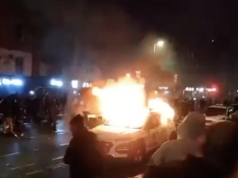The arrests at the Sarah Everard vigil have sparked significant debate on the policing of protests.
The murder of Sarah Everard is a story that has shocked the nation and has spurred huge online campaigning regarding women’s experiences and sexual assault.
The event has struck a nerve with huge numbers of people; as such, many of those individuals travelled to Parliament Square to pay respects at Sarah Everard’s vigil.
One of these people was Patsy Stevenson, who was dragged to the floor by officers and arrested for attending the event. The scene has shocked many, and it seems that on the left and the right, people are united around the hostility of the arrest and what it symbolises.
As protests continued yesterday, new attention has been drawn to the new policing Bill, which if passed, will reform significant aspects of policing guidelines. The changes influence a variety of police guidelines, but some changes are in the protest category. This now has the attention of both the left and the right, with some fearing it gives the police too much power.
Ms Stevenson’s arrest has even reached the top of the Home Office, with Home Secretary Priti Patel stating it was “upsetting” and demanding a full report.
Following the incident, there have been many calls for Met Police Chief Commissioner Dame Cressida Dick to resign after the treatment of Ms Stevenson and the overall attitude to these new protests and the vigil.
It is opening up significant debate on the issue of protesting, but one thing is for sure: the left has acknowledged the issues of restricting protest and the right are there to back them. Now, we can only wait to see how the Commons will vote, and whether MPs will listen to the ever-growing voice of opposition to the new Bill.



